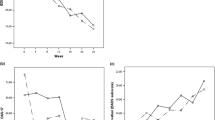Abstract
Twenty-five depressed subjects were allocated to either behavioral treatment, cognitive treatment, or no-treatment conditions for an 8-week period. Measures of depressive-related symptomatology and treatment-related target areas were administered prior to treatment, at midtreatment, and immediately following treatment. Depression was also assessed at a 5-month follow-up. Marked improvement was observed on most measures across the treatment period in both treatment conditions but not in the notreatment condition. Cognitive and behavioral treatments were found to be equally effective in alleviating depression. Treatment effects were maintained at the follow-up. At all but the midtreatment assessment, the two treatments were found to have an equivalent impact on treatment-related target areas. Various explanations of the results are offered, including the role of nonspecific treatment factors.
Similar content being viewed by others
Reference Note
MacPhillamy, D. J., & Lewinsohn, P. M.Manual for the Pleasant Events Schedule. University of Oregon, 1976. (Mimeo)
References
Beck, A. T.Cognitive therapy and the emotional disorders. New York: International Universities Press, 1976.
Beck, A. T., & Beamesderfer, A. Assessment of depression, the depression inventory. In P. Pichot (Ed.),Psychological measurements in psychopharmacology and modern pharmacopsychiatry (Vol. 7). Basel, Switzerland: Kerger, 1974.
Beck, A. T., Ward, C. H., Mendelson, M., Mock, J., & Erbaugh, J. An inventory for measuring depression.Archives of General Psychiatry 1961,4 561–571.
Ellis, A.Reason and emotion in psychotherapy. New York: Lyle Stuart, 1962.
Fuchs, C. Z., & Rehm, L. P. A self-control behavior therapy program for depression.Journal of Consulting and Clinical Psychology 1977,45 206–215.
Hamilton, M. A rating scale for depression.Journal of Neurology, Neurosurgery and Psychiatry 1960,23 56–62.
Lewinsohn, P. M., Biglan, A., & Zeiss, A. M. Behavioral treatment of depression. In P. O. Davidson (Ed.),The behavioral management of anxiety, depression and pain. New York: Brunner/Mazel, 1976.
McLean, P. D., & Hakstian, A. R. Clinical depression: Comparative efficacy of outpatient treatments.Journal of Consulting and Clinical Psychology 1979,47 818–836.
Newmark, C. S., Frerking, R. A., Cook, L., & Newmark, L. Endorsement of Ellis' irrational beliefs as a function of psychopathology.Journal of Clinical Psychology 1973,29 300–302.
Poor, D. D. S. Analysis of variance for repeated measures designs: Two approaches.Psychological Bulletin 1973,80 204–209.
Rehm, L. P., Fuchs, C. Z., Roth, D. M., Kornblith, S. J., & Romano, J. S. A comparison of self-control and assertion skills treatments of depression.Behavior Therapy 1979,10 429–442.
Rush, A. J., Beck, A. T., Kovacs, M., & Hollon, S. Comparative efficacy of cognitive therapy and pharmacotherapy in the treatment of depressed outpatients.Cognitive Therapy and Research 1977,1 17–37.
Shaw, B. F. Comparison of cognitive therapy and behavior therapy in the treatment of depression.Journal of Consulting and Clinical Psychology 1977,45 543–551.
Taylor, F. G., & Marshall, W. L. Experimental analysis of a cognitive-behavioral therapy for depression.Cognitive Therapy and Research 1977,1 59–72.
Wessman, A. E., Ricks, D. F., & Tyl, M. M. Characteristics and concomitants of mood fluctuations in college women.Journal of Abnormal Psychology 1960,60 117–126.
Wilson, P. H. Combined pharmacological and behavioural treatment of depression.Behaviour Research and Therapy 1982,20 173–184.
Zeiss, A. M., Lewinsohn, P. M., & Munoz, R. F. Nonspecific improvement effects in depression using interpersonal skills training, pleasant activity schedules, or cognitive training.Journal of Consulting and Clinical Psychology 1979,47 427–439.
Author information
Authors and Affiliations
Additional information
The authors would like to thank Michael Nicholas and Lea Crisante for their assistance in the therapy procedures.
Rights and permissions
About this article
Cite this article
Wilson, P.H., Goldin, J.C. & Charbonneau-Powis, M. Comparative efficacy of behavioral and cognitive treatments of depression. Cogn Ther Res 7, 111–124 (1983). https://doi.org/10.1007/BF01190064
Issue Date:
DOI: https://doi.org/10.1007/BF01190064




